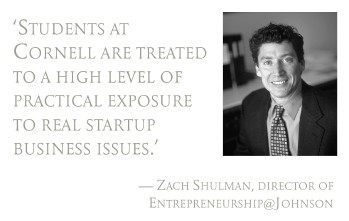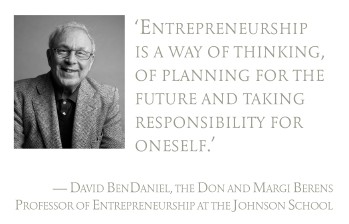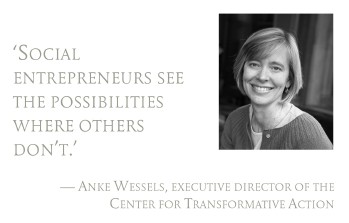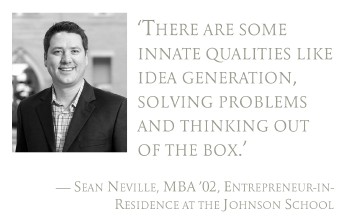COVER STORY

Nurturing big ideas at Cornell University: Planting seeds of innovation in the classroom
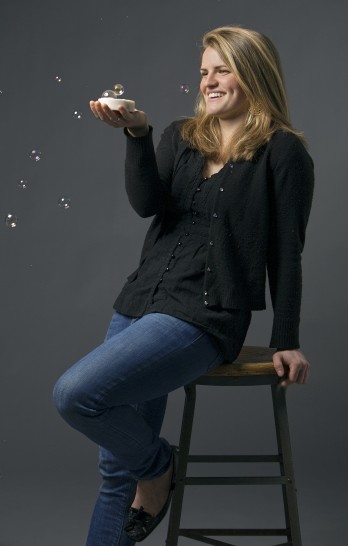
Meryl Gabeler 10 took entrepreneurship classes, joined eLab and met with alumni to grow the Ayurvedic soap business she started with her mother. See larger image
Mark Levatich '10 has been a tinkerer and a problem-solver all his life. As a teenager, he built his own metal and woodworking shop, crafting the forge from scratch, and in high school he created a four-player chess game.
These days, Levatich, who graduated last December with dual degrees in biological and environmental engineering and biological sciences, is tinkering in a different area -- brain surgery.
After observing a number of neurosurgeries as part of an internship program at Weill Cornell Medical College in New York City, Levatich developed a device that uses bone cement to help surgeons seal holes created during pituitary surgery. His invention isn't available for human use yet, but in the meantime surgeons have created a new surgical technique based on his designs and performed it 17 times last summer. Levatich also was honored by the U.S. Patent Office as one of the top three undergraduate Inventors of the Year for 2009. Now he's hard at work creating his own company.
"I just asked the surgeons about the hardest things they do," Levatich says. "There aren't engineers in the hospital. No one had ever asked them that before."
It was a pure learning experience.
While many leading research universities take advantage of their location, infrastructure and an abundance of local venture capital to churn out startup companies from their inventions, Cornell's approach to entrepreneurship has always been focused on education: experiential learning to help students think and act like entrepreneurs no matter where their careers take them. At the same time, an increasing number of Cornell students and young alumni are using this knowledge to begin their own ventures.
As the United States continues to recover from the Great Recession, few areas are more important than developing entrepreneurs who can take their education into the marketplace and become the creative source for new jobs. As visiting business professor Steven Gal points out, "Entrepreneurs create the jobs that lead us out of recession; they always have and always will."
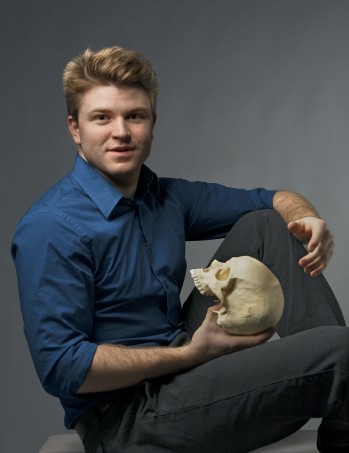
Mark Levatich 10, who graduated in December with degrees in biological and environmental engineering and biological sciences, developed a device that helps surgeons seal holes created during a type of pituitary surgery. See larger image
Indeed, the Ewing Marion Kauffman Foundation says that more than half of the companies on the Fortune 500 in 2009 were started during a recession or bear market, and seven out of the top 10.
To encourage students to become the entrepreneurs of tomorrow, Cornell offers 45 courses in nearly every school and college, up from only six courses in 1990. Students can also take advantage of 25 student clubs, attend numerous speaker events, become a part of a business incubator, network with successful alumni who return to campus in various roles and seek summer internships focused on small companies.
For the past 25 years, many of these students, both undergraduates and aspiring MBAs, have been taught to think like entrepreneurs by David BenDaniel, the Don and Margi Berens Professor of Entrepreneurship at the Johnson School. "Entrepreneurship is a way of thinking, of planning for the future and taking responsibility for oneself," he says.
Nearly everyone can learn entrepreneurial skills, no matter what their career path, BenDaniel says, and over the years, many of BenDaniel's more than 5,000 students have written to say that his classes gave them self-confidence. "In my class, they learn to believe in themselves," he says -- the essential mindset for anyone who challenges the marketplace.
Taking the longer view
The guiding principle at Cornell is experiential learning. "Students at Cornell are treated to a high level of practical exposure to real startup business issues," notes Zach Shulman, ILR '87, Law '90, director of Entrepreneurship@Johnson. "In any given week, students can go to a number of events and really dig in."
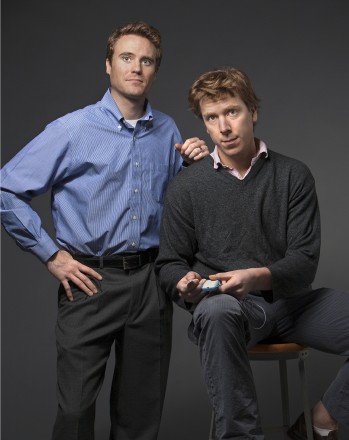
Bryant Guffey MBA 10, left, and Ph.D. student George Lewis Jr., are developing a miniature ultrasound therapy device, using technology licensed from Cornell, that helps patients with pain management. See larger image
"At Cornell, we take a longer view of when entrepreneurial opportunities may happen for a student," says Deborah Streeter, The Bruce F. Failing Sr. Professor of Personal Enterprise and Small Business Management in the Department of Applied Economics and Management. "Sometimes it will happen when they're at college or even before. Sometimes it will be within a bigger company or a governmental organization. And sometimes it will be 15 or 20 years down the road.
"The best way to prepare students is to focus on the underlying skills that entrepreneurs need -- opportunity recognition, market validation and basic tools like business planning."
The main engines of the growth of entrepreneurship across campus are the commitment of the deans of the nine participating colleges and schools that make up Entrepreneurship@Cornell, along with active alumni and faculty who form the core of the E@C program.
One clear recent indication of this growth has been the fast emergence of eLab, the undergraduate business incubator, started by Student Agencies and E@C in 2008. It provides a physical office space, alumni mentors and business assistance to undergrads and also offers seminars open to all Cornell students, focusing on business planning and marketing.
Some Cornell students come to campus already sold on entrepreneurship. They're here looking for a great business idea or want to learn the skills they need to run their own enterprise. Others may hear about an interesting entrepreneurship class, listen to an alumni presentation or join a club and find themselves bitten by the entrepreneurship bug.
But for Meryl Gabeler '10 it was her mother, Cary, who first influenced her. The two have always enjoyed getting together to dream up business ideas. "When I was younger, I had car washes and ran smoothie stands in my driveway," Meryl Gabeler says of her entrepreneurial roots. "My mom had a childrenswear manufacturing company, and I remember her toting us around to factories in Brooklyn."
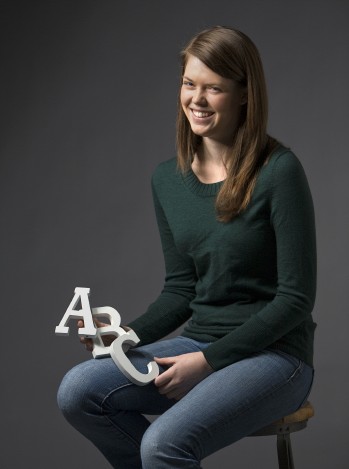
Alison Ewing 10 joined Entrepreneurship@Cornells internship program, spending a summer with reading software company Sound Reading Solutions, creating marketing materials and leading the company into the world of social media. See larger image
The pair's latest venture is in India, making delicate soaps combining the benefits of Ayurveda, the traditional Indian medicine that uses natural herbs and medicines, with exotic fragrances. To develop their product line, the Gabelers opened up their cupboards and started mixing spices, herbs and teas to find scents.
Started in March 2009, the company's products are now in 30 stores around the New York City metro area and are available on the Web at anjolienyc.com.
To help her grow her business, Meryl Gabeler took several entrepreneurship classes, met with entrepreneurial alumni who spoke on campus and applied to be a member of eLab, where she connected with other student business owners and met alumni who helped her solve business problems.
"Since it's lonely being an entrepreneur, it's nice to get out of your world and connect with other students," she says. "There's a positive and contagious energy there."
From soaps to high tech, Bryant Guffey's product could easily be mistaken for an iPod, although people who wear it aren't listening to the latest Lady Gaga song -- they're getting a dose of ultrasound pain therapy.
Not to be confused with ultrasound imaging, Guffey's product is a power-packed miniature ultrasound therapy device that can help ease arthritis pain for elderly patients or relieve the sore muscles of middle-aged weekend warriors, all with the ease of applying a bandage.
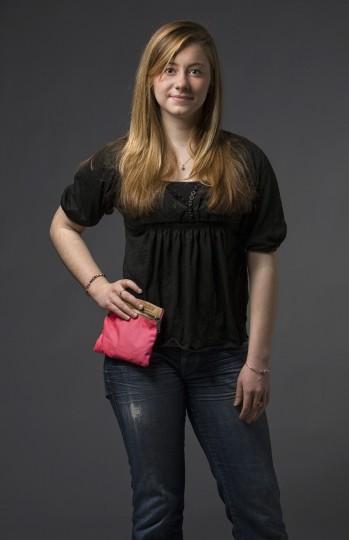
Lauren McHugh 10, a psychology major, designed Bright Pink, a line of purses that will be distributed to women in certain African townships to deter thieves by signaling that the purses contain no cash. McHugh made it to the semifinals of this years Big Idea competition. See larger image
Guffey, MBA '10, co-founded his company with Cornell Ph.D. student George Lewis Jr., who developed the process to shrink powerful ultrasound devices so that patients can receive therapy at home or on the road. The two licensed the technology from Cornell and will be applying for Food and Drug Administration approval of the device.
Solving social problems
A new generation of student entrepreneurs is also gaining ground on campus, students who have a desire to create an enterprise -- many non-profit -- to address a pressing social need.
"Social entrepreneurs see the possibilities where others don't," says Anke Wessels, executive director of the Center for Transformative Action. Wessels began a new course in fall 2008 called Social Entrepreneurs, Problem Solvers and Innovators, which requires students to create a viable project to address a critical social issue.
Sheridan Reiger '10, discovered his social entrepreneurship venture during a volunteer trip to Honduras where he worked as an EMT in a rural clinic. Now he's the founder of the NGO Salud Juntos which empowers Honduran communities through the development of sustainable health systems and health education. Reiger has been one of many students honored by Cornell and the Ashoka Foundation as "campus changemakers" during twice-yearly events on campus.
Another student working with developing countries is Lauren Braun '11, who has applied for a patent for a device that helps mothers remember their children's vaccination appointments. Braun developed the idea after working for a Peruvian medical clinic during the summer of 2009.
"The Peruvian nurses would spend hours hiking up into mountain villages looking for mothers," says Braun. That's because the clinic's paper appointment slips didn't work for women who carry babies on their backs rather than purses and do hard daily labor rather than keep calendar books.
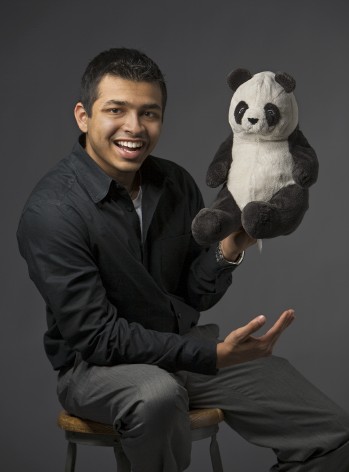
Anuj Gupta 11, an applied economics and management major, created Lingo Buddies, a line of stuffed animals associated with different countries and languages that teach young children phrases. Gupta made it to the semifinals of this years Big Idea competition. See larger image
Dan Cohen, eLab entrepreneur in residence and a professor in the ILR School, is amazed by the huge interest of students in improving the world through innovation. "When we started, we wanted to see if there was adequate demand for this type of service," he says. "Now we are near capacity and applications keep flowing in."
He adds, "A great entrepreneur will basically build his or her own eLab through networking and intelligence to make their concept work, but we can make this process quicker and less painful."
Students are also aided by Entrepreneurship@Cornell's other offerings:
- The Cornell Entrepreneur Network for alumni, which since 2001 has hosted more than 16,000 alumni at hundreds of events in cities across the country.
- Three introductory entrepreneurship courses, begun in 2004, that have been consistently popular, enrolling an average of 700 students each year. In the 2009-10 academic year, 52 faculty across the campus were affiliated with the entrepreneurship program.
- The E@C Web site, offering viewers a complete picture of entrepreneurial activities, groups, events and courses on campus.
- The annual two-day Entrepreneurship@Cornell "Celebration" event on campus in April, bringing together more than 800 people for networking, symposia, a gala dinner and other events highlighting Cornell's spirit of entrepreneurship and honoring the Cornell Entrepreneur of the Year.
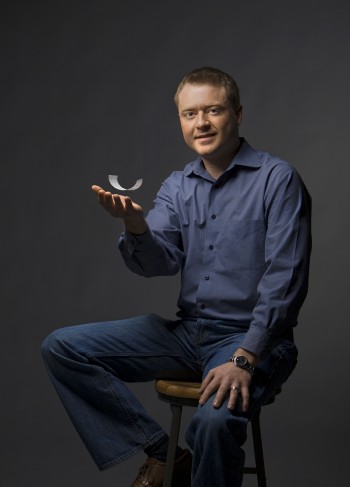
Keith Cowing, MBA 10, has developed an online receipts business, replacing traditional paper purchase receipts with an e-mailed version that also promises new ways for businesses to interact with their customers. See larger image
- Though not strictly an E@C program, eClips, Cornell's video clip collection on entrepreneurship and business, which has grown to more than 14,000 titles and has an international following among educators, students and entrepreneurs.
- E@C's internship program, which places more than 60 students a year with small- to mid-sized companies, helps many students make connections. Alison Ewing '10 experienced the daily life of an entrepreneur in a summer internship with Sound Reading Solutions in Ithaca, which sells software and materials to help children and adults learn to read. The experience sold Ewing on marketing as a career.
"Never in an internship had I been able to decide what projects I wanted to work on," says Ewing, a history major. At Sound Reading Solutions she not only assisted with the company's daily operations, but also created marketing materials, helped redesign its Web site, led the company into social media, created an e-mail customer contact system and even starred in a TV commercial for the company.
Providing the right environment
Cornell entrepreneurship faculty and staff say even the most savvy, natural-born entrepreneur can benefit from learning certain skills.
"There are some innate qualities like idea generation, solving problems and thinking out of the box," says Sean Neville, MBA '02, entrepreneur-in-residence at the Johnson School and himself the founder of an audiobook company. "But Cornell can provide the environment to nurture those innate qualities and guide those ideas."
Neville says his experiences at Cornell helped him learn to "think in a structured fashion about business problems and do it in a low-risk environment."
Indeed, 1,520 alumni who participated in a 2008 survey said that taking at least one Cornell entrepreneurship class made an impact on their career choice and their opinion of entrepreneurship.
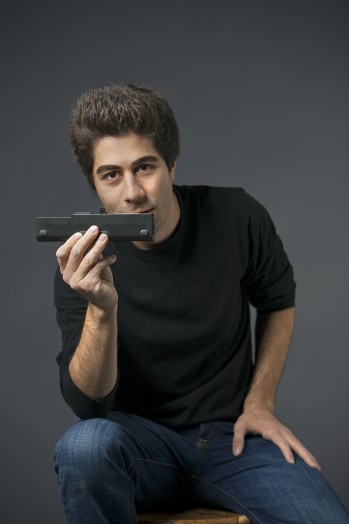
Farhod Rockwell Sharezay 10, an economics major in the College of Arts and Sciences and an eLab student member, designed a more environmentally friendly laptop battery that utilizes off-the-shelf rechargeable cells and allows the battery casing itself to be reused. See larger image
Lawrence Watkins, MBA '10, said he's not naturally gregarious, a skill often thought to be vital to success as an entrepreneur. But his passion and the lessons he learned at Cornell helped him grow his public speakers business, Great Black Speakers Bureau. Today it represents more than 200 speakers, up from just 12 in 2007.
"I think there's more than one way to be an entrepreneur," says Watkins, who began by managing the speaking career of his brother, Boyce Watkins, a professor of finance at Syracuse University and a social commentator who has appeared on many TV programs, including "Good Morning America," and on CNN and MSNBC.
"There has been a sea change in the pervasiveness of an entrepreneurship culture and the growth of an entrepreneurial community on campus over the last decade," says John Jaquette, director of Entrepreneurship@Cornell since 1997. "The changes were driven by students, encouraged and supported by alumni, and led by a growing number of faculty."
One of those students is Keith Cowing, MBA '10, whose business, SeamlessReceipts, will soon be offering retailers a new way to connect with customers by offering them an e-mail receipt of their purchase. The receipts also will help retailers interact with customers through e-mail and social media.
So original is the idea that last May it won top honors of $250,000 in New York City's Draper Fisher Jurvetson East Coast Venture Challenge. The Cornell student, who is in the process of refining the software before rolling out his product later this year, recalls that when the idea came to him, like so many great ideas, it seemed so obvious. "It was mostly inspired by my wife always asking me for receipts, which I couldn't find," says Cowing.
Kathy Hovis is a freelance writer in Ithaca.

